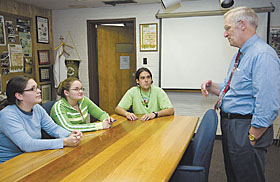  |
| HOME | THIS ISSUE | CALENDAR | GRANTS | BACK ISSUES | < BACK | NEXT > |
Acid rain specialist shares scientific expertise with students, facultyby Cindy Weiss - November 14, 2005 |
||||
|
Acid rain is an environmental problem that has yet to be solved, according to ecologist Gene Likens. Likens is credited with discovering acid rain in North America more than 40 years ago while studying the Hubbard Brook Experimental Forest in New Hampshire’s White Mountains. A National Medal of Science winner, Likens is currently on his first annual two-week visit to UConn as a Distinguished Research Professor (Visiting) in the Department of Ecology and Evolutionary Biology, an appointment he received last spring. He is the founding director of the Institute of Ecosystem Studies in Millbrook, N.Y., a center of highly-cited ecological research. During his stay, he is meeting with students, conducting a graduate seminar on scientific ethics and communications for students and faculty, lecturing to classes, and visiting labs. Last week he gave a public lecture, describing the 43 years-worth of data he has collected on acid rain and forest ecosystems. Likens blames the combustion of relatively cheap fossil fuels for global warming and acid rain. “It’s a complicated problem,” he said. Even though acid rain has been reduced through emissions standards set by the Clean Air Act and its amendments, the sulfur emissions that the law restricts have not been reduced enough, and nitrogen emissions, which it addresses very little, are increasing. Since he began studying at Hubbard Brook, he has seen headwater streams acidified, and observed higher mortality rates in sugar maples at higher elevations where the soil is thinner, the environment harsher, and the trees most affected by acid rain. The problem is at its worst in the Northeast, which gets wind-blown emissions from coal and oil-fueled power generating plants in the middle of the country.
The precipitation in the Northeast has eight times more acid on a yearly average than it would if the atmosphere were not polluted, Likens said. His “control” areas for judging pollution’s effect on rain chemistry are remote, unpolluted places in the southern hemisphere, such as in South America and on an island in the Indian Ocean. UConn biologists are benefiting from Likens’ expertise on more than ecological issues, however. During his graduate seminar on scientific ethics and communications last week, which attracted faculty and students from genetics, engineering, geosciences, and pharmacy as well as ecology and evolutionary biology, he discussed ethical questions raised by a case study on responsible conduct in scientific research. Likens, a well-known and highly quoted scientist, has been involved in many public policy issues. His visit is “an opportunity to get him to interact with faculty and students,” says Greg Anderson, interim vice provost and dean for graduate research and education. “It’s like having an in-residence artist or musician.” Likens, formerly a professor at both Cornell and Dartmouth, said his goal in teaching the ethics and communications seminar is to help graduate students think about issues they may not have considered before, but which they will encounter during their careers. |
| ADVANCE HOME UCONN HOME |

